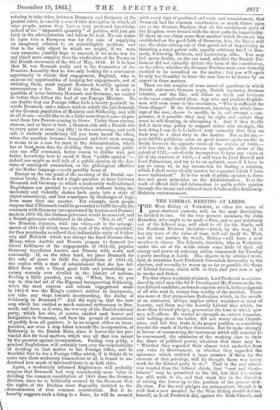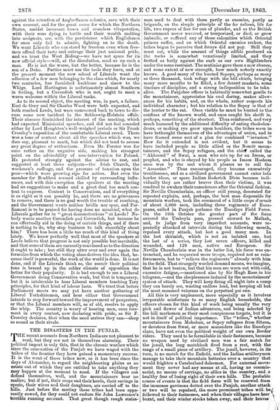THE LIBERAL MEETING AT LEEDS.
The first object was fairly attained ; Lord Frederick was intro- duced by tried men like Sir F. Crossley and Mr. Forster as the fu- ture Liberal candidate, and made a speech which, in the j udgment of all who read it, stamps him worthy of the position. There was none of that purposeless Radicalism which, in the mouth of an aristocrat, always implies either weakness or want of honesty, and there was the heartily Liberal bias which, far more than Liberal pledges, guarantees the tone to which new men will adhere. He wasted no strength on extinct formulas, said nothing about the ballot, did not worry about Church- rates, and left free trade in its proper position as something beyond the reach of further discussion. But he spoke strongly in favour of commencing the movement which still remains to be commenced, the admission of the working class to their due share of political power, whatever that share may be. "Whether they regarded their almost total exclusion from any voice in Government, or whether they regarded the ignorance which unfitted a large number of them for the exercise of that privilege, still he thought there was heavy work for the Liberal party to do." That is the real admis- sion wanted from the Liberal chiefs, that "rest and thank- fulness" may be permitted to the old, but that the nation has still work to do, and that work lies in the direction of raising the lower up to the position of the present mid- dle class. For the rest pledges are unimportant, though it is well that a new member for the West Riding should declare himself, as Lord Frederick did, against the Irish Church, and against the retention of Anglo-Saxon colonies, save with their own consent, and for the great cause for which the Northern States, amidst incessant losses and ceaseless vituperation, with their sons dying in battle and their wealth melting into assignsts, are, with the persistence which Englishmen for once only fail to admire, fighting on to the death. We want Liberals who can stand by freedom even when free- men offend their taste and outrage their just national pride, and we trust the West Riding—we have not space for its new official style—will, at the dissolution, send us up such a man. He is not the worse, but the better, because he is the son of a Duke. Parties must use the tools they have, and at the present moment the new school of Liberals want the adhesion of a few men belonging to the class which, for nearly two centuries has furnished backbone and sinew to the Whigs. Lord Harlington is unfortunately almost Southern in feeling, but a Cavendish who is not, ought to meet a warm welcome within the Liberal ranks.
As to its second object, the meeting was, in part, a failure. Earl de Grey and Sir Charles Wood were both expected, and both reached Leeds, but were summoned back to town to dis- cuss some new incident in the Sehleswig-Holstein affair. Their absence diminished the interest of the meeting, which had expected Ministerial speeches, and did not feel consoled either by Lord Houghton's well-weighed periods or Sir Frank Crossley's exposition of the comfortable Liberal creed. There was a tone of content about all the speeches which was, we dare say, pleasant to mark, but which did not tend to arouse any great degree of enthusiasm. Even Mr. Forster was for once rather on the negative side, making his strongest point on the advisability of non-intervention for Poland. He protested strongly against the advice to rest, and suggested at least three subjects—the Irish Church, the workmen's suffrage, and the pressure of taxation upon the poor—which were growing ripe for action. But even the member for Bradford seemed chilled by surrounding influ- ences, and with this exception the speakers at the meeting had no suggestions to make and a great deal too much con- tent to express. Content is Conservatism, and if everything is as right as it can possibly be, and there are no grievances to remove, and there is no goal worth the trouble of reaching, and the Government wants neither bridle nor spur, and Par- liament is to be praised for having done no mischief, what do Liberals gather for in "great demonstrations" at Leeds? No- body wants another Cavendish qua Cavendish, but because he can effectually aid in the doing of certain things, and if there is nothing to do, why stop business to talk cheerfully about him? There has been a little too much of this kind of thing lately. We know perfectly well that most of the speakers at Leeds believe that progress is not only possible but inevitable, and that some of them are earnestly convinced as to the direction it ought to take ; but still they utter over and over again the formulas from which the voting class derives the idea that, be- cause itself is powerful, the work of the world is done. It is not done, and if the Liberals think so' the sooner their political tone is braced up in the colder climate of opposition the better for their popularity. It is bad enough to see a Liberal Government doing Conservative work, but that is temporary, but it is intolerable to hear Liberal members teaching Tory principles, for that kind of labour lasts. We trust that before Parliament meets we may yet have another gathering of Liberal Yorkshiremen and hear either that Government intends to step forward toward the improvement of pauperism, or that the Liberal members will, as of old, resolve to apply the whip. The country is weary of hearing men, once fore- most in every contest, now declaring with pride, as Sir F. Crossley declares, that when the need arrives they can—sleep as sound as their rivals.



































 Previous page
Previous page